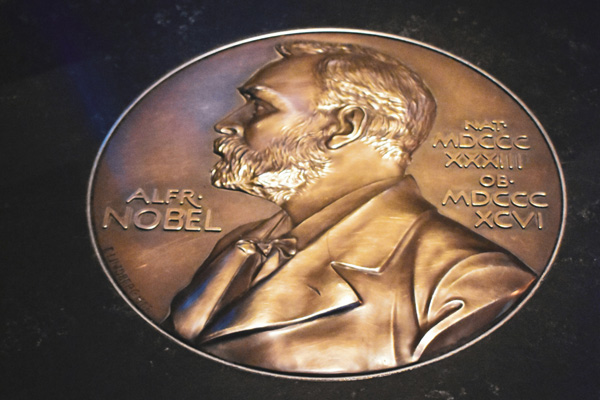South Korean author Han Kang wins this year’s Nobel Prize in literature

[Nobel Prize Medal. Photo Credit to Unsplash]
Han Kang, the 53-year-old Korean author, made history on October 10th as the first Korean to win the Nobel Prize for literature.
Her achievement marks the 18th time a woman has received this honor, with Han Kang being the first Asian woman to win it.She is also the first female Nobel laureate of 2024.
Previous laureates of the prestigious prize include Ernest Hemingway, William Faulkner, Gabriel Garcia Marquez, Bob Dylan, and Kazuo Ishiguro.
Remarkably, she is also only the second South Korean to ever win a Nobel Prize.
Han Kang was born in 1974, in Gwangju, South Korea.
After moving to Seoul at 10 years old, she studied Korean literature at Yonsei University.
In 2000, former President Kim Dae Jung won the Nobel Peace Prize for his sunshine policy toward North Korea and his efforts to restore democracy in South Korea.
The prize, awarded by the Swedish Academy, is worth 11 million Swedish crowns, equivalent to approximately 1.1 million U.S. dollars.
As one of the most coveted awards, the Nobel Prize in literature, awarded by the Swedish Academy, is one of the highest acclaim an author can receive in recognition of their oeuvre, which is their life’s works as a whole.
According to the Nobel Foundation, Han Kang was recognized “for her intense poetic prose that confronts historical traumas and exposes the fragility of human life”
Han’s body of works, including novels, novellas, essays, and short stories center around the vulnerable, often female, lives.
Although widely known as a novelist, Han Kang’s career began with poetry, publishing her first poems in 1993.
Her poetry explores the fragmented human body, and places juxtaposed with objects.
Her first global breakthrough came with her groundbreaking novel The Vegetarian, which was her first work to be translated into English.
Currently, her novels have been published in more than 30 languages.
Published in 2007, The Vegetarian tells the story of a young Korean woman who chooses to stop eating meat after dreaming about the animals’ violent deaths.
A descent into mental illness follows her decision, as years of neglect by her family and their savage response to her taking control over her own body are also revealed.
The sophisticated and thought-provoking novel explores themes of isolation, rebellion, challenging societal norms, especially conformity and patriarchy.
The novel earned her the Man Booker prize in 2016, earning her a global readership.
Han Kang’s books explore and confront the violence embedded in Korean history, as well as the dark side of humanity.
Another well-known novel of hers is Human Acts, which centers on the 1980 Gwangju massacre, when an uprising by Korean citizens against the dictatorship was violently suppressed by the military, resulting in nearly 200 fatalities, most of whom were civilians.
The novel recounts the historical event, narrating the sufferings of the victims, witnesses and survivors, forcing us all to not only remember, but confront the truth.
In his congratulatory message, , Korean President Yoon Suk Yeol recognized how she confronts Korea’s historical traumas as he said “You converted the painful wounds of our modern history into great literature… I send my respects to you for elevating the value of Korean literature”
Beyond these, her other works include Impossible Goodbyes, The White Book and Greek Lessons.
Greek Lessons is a more hopeful novel that highlights the redemptive power of love as the novel centers around a woman who has lost the ability to speak and signs up to study ancient Greek with an instructor who is slowly losing his ability to see.
The statement by the Nobel Prize board also recognizes how her work “crosses boundaries by exploring a broad span of genres - these include violence, grief and patriarchy”.
Often described as intense and dark, Han’s novels explore human being’s capabilities for violence.
Han Kang was not neither prepared for nor expecting to win.
In fact, she said "I’m so surprised and absolutely I’m honoured,”, in a phone interview with the Swedish Academy.
Her prose, known for its lyrical, poetic and experimental style is metaphorically charged.
Despite this incredible news, Han Kang has refrained from doing many interviews, choosing to remain quite private.
After she had won the Prize, on one of the few occasions, she had said, “‘With the war intensifying and people being carried out dead every day, how can we have a celebration or a press conference?’”.
A visionary writer, her profound yet subtle work being recognized by the Nobel committee has important implications for Korea.
Firstly, her winning has spurred hope of global recognition for Korean literature and history.
Furthermore, her win spotlights the growing significance that translation will have in expanding literary horizons, emphasizing how there needs to be better systems to support it.
Han Kang’s incredible feat is an exciting sign for positive, disruptive challenges to the traditionally English-dominated literary world.
Han Kang’s Nobel Prize win demonstrates to the world that diverse voices, fresh perspectives, and rich cultural depth are finally gaining prominence.

- Victo Choi / Grade 9
- Saint Johnsbury Academy Jeju

![THE HERALD STUDENT REPORTERS [US]](/assets/images/logo_student_us.png)
![THE HERALD STUDENT REPORTERS [Canada]](/assets/images/logo_student_ca.png)
